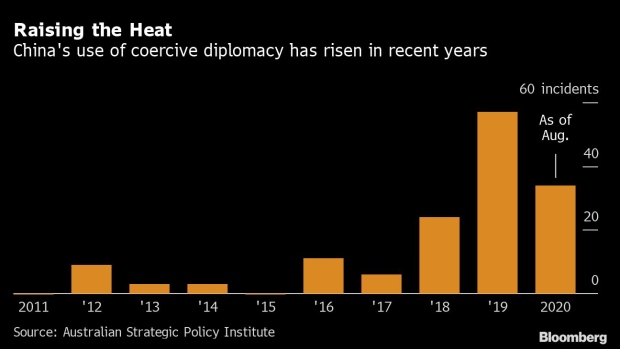Increasingly, Westerners with business
interests in China are beginning to reassess the risks of travel to a
country that has increasingly made use of 'detention diplomacy' to
register its displeasure with other countries' attitudes toward
Beijing's policies and behaviour and specifically that of the Chinese
Communist Party ruling elite. Business executives now consider the risk
of being carried off by security agents in China, to become yet another
casualty of geopolitical tensions that have emerged between Beijing and
the West, most specifically the United States.
The
arbitrary detention and charging of two Canadians with espionage and
endangering the security of China when they were taken into custody in
2018 following hard on the detention of Huawei CFO Meng Wanzhou on an
extradition warrant by the United States which saw the RCMP arrest
Ms.Meng at a stopover at Vancouver International Airport in December of
that year appears to have initiated a new strategy for China, of
coercive diplomacy.
Michael
Kovrig and Michael Spavor remain imprisoned, subject to human rights
violations imposed by the CCP, including denial of access to a lawyer,
while Meng Wanzhou is free on bail to live in her two luxury Vancouver
mansions while her extradition case winds its way through the court in
accordance with Canadian and international law. Since the detention of
the two Michaels other countries have had to deal with their nationals
taken into detention in China, Australia among them.
This
new way of 'influencing' and demanding the attention of other countries
to China's growing clout through the world community has not endeared
it to the countries being targeted who also have raised the issue of
human rights violations with respect to Chinese Uyghurs' detention and
brain-washing, and Beijing's hard-handed anti-democracy clamp-down of
Hong Kong, along with its threats to Taiwan, added to Beijing's
assertion of rights-of-possession in the South China Sea and its
territorial aggression against India.
Anne
Stevenson-Yang of J Capital Research has realized riveting reservations
around returning to China to advance her business interests as research
director of her company, prepared now to give up her frequent business
trips to China. The risk of being taken in by security agents and
imprisoned on charges having nothing in relation to reality fails to
appeal to her sense of self-preservation. She and her husband and
children moved to the U.S. six years ago from China, now she fears the
risk of returning for any reason, personal or business.
A
dozen executives, diplomats, consultants and academics have given their
opinions in interviews, asking their names be withheld for security
purposes, many of them believing an increased risk in travel to China
will instruct them in future plans to avoid making themselves
vulnerable, with the potential of ending up in prison. Passage of a
security law in Hong Kong has failed to reassure that China's closed
justice system can be relied upon to mete out justice, as it were.
Police,
prosecutors and courts are known to hew the Communist Party line. Under
Chinese law authorities are able to arrest 'suspects' and maintain
incarceration for prolonged periods without trial under the newer and
increasingly wide-ranging national security laws. Chinese citizen Haze
Fan, a Bloomberg News staffer, was recently detained in Beijing with
China confirming that she is being held by the Beijing Municipal
National Security Bureau on suspicion of 'endangering national
security', but authorities refuse to release details of her case.
Mostly, without doubt, since there are none.
Semiconductor
Manufacturing International Corp representing the largest chipmaker in
China was placed by the Trump administration on a blacklist along with
over 60 other Chinese companies, leading the Chinese Ministry of
Commerce to threaten retaliation to the move denying Chinese companies
access to American technology, from software to circuitry. A move that
has increasingly soured China on all relations with Western sources.
China
maintains it is being maligned by the label of "hostage diplomacy",
being "totally groundless". No one, they stress, who respects the law of
the land would have any reason to fear arrest. In turn Chinese
executives express concern at the visit of spokeswoman Hua Chunying,
U.S. Foreign Ministry spokeswoman this month, claiming Meng Wanzhou's
arrest to be "100 percent a political incident". Zhao Lijian, a Chinese
foreign ministry spokesman hinted political intervention lifting
proceedings against Meng "could open up space for resolution to the situation" of the two Canadian Michaels.
Data
on eight categories of "coercive measures" was compiled in a recent
report produced by the Australian Strategic Policy Institute noting
actions such as those Beijing has embarked upon have sharply risen in
the past few years through arbitrary detention, execution, popular
boycotts, pressure on specific companies, state-issued threats and
restrictions on official travel, investment, trade and tourism.
Beijing's novel initiatives on how to make friends and influence
countries.
"I know a lot of business people who are out of China now and are very afraid of going back",
one executive asking for anonymity, stated; he and others, in
particular former government officials working as consultants have
become increasingly wary. The U.S. State Department warned American
citizens they face risk of arbitrary arrest and exit bans; to avoid
unnecessary travel to China -- and the Canadian Foreign Affairs
department has issued a like warning. Little wonder relations are
frayed.



<< Home